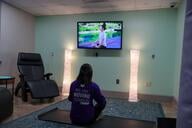You have /5 articles left.
Sign up for a free account or log in.

iStock/dolgachov
Dear Kerry Ann,
I’m still reeling from the outcome of the election. I feel sad, disappointed, angry and anxious. As the only scholar of color in my department, I’m also experiencing a dramatic escalation of requests for my time: Can I speak at postelection campus events? Can I be the designated contact person for upset students? Can I extend my office hours in order to support students? And so on.
I’m also finding myself highly agitated by my colleagues. People I have never had a political conversation with prior to the election keep asking me, “What do you think?” Then they respond with a denial of the racism, sexism and xenophobia revealed in the outcome of the election. And I swear, if one more safety-pin-wearing senior colleague hugs me (without permission), I’m going to scream!
I’m completely exhausted, and I have no idea what to do in this new reality. I want to support students and I feel compelled to work for positive change, but I also received a third-year review that was highly critical of my research productivity. I know that all the additional requests I’m receiving won’t be factored in when I come up for tenure, but it feels impossible to proceed with business as usual. Any advice you can offer would be greatly appreciated.
Sincerely,
Overstretched Assistant Professor
Dear Overstretched,
The intense emotions and elevated expectations you describe are widespread among faculty members after the recent election and its aftermath of campus hate crimes. And these events have resulted in disproportionately increased expectations (both formal and informal) for underrepresented scholars. I agree that it’s difficult to proceed with a “business as usual” approach when everything has changed so much, so quickly. I also imagine that stressors on underrepresented faculty members will continue to increase even as your evaluation criteria for tenure will remain the same.
Given this new reality, I want to suggest that it is possible to move forward in new and different ways that are not just “business as usual.” But this will require trying some new behaviors, committing to new levels of clarity and drawing some new boundaries.
Self-Care Is No Longer Optional
I’ve written quite a bit about radical self-care during difficult times. And yet, over the past two weeks, I have watched many faculty members abandon self-care in favor of negative coping mechanisms (i.e., overworking, overeating, increased alcohol consumption, binge watching TV and/or compulsive consumption of social media). Even more problematic is the way some are wearing exhaustion as a badge of honor by rationalizing that anyone who is not completely exhausted is not serious about doing the work.
During difficult times, you should increase, not abandon, your self-care. And I will go a step farther to encourage you to be expansive in your kinds of intentional choices that you make to improve your physical, emotional and relational health. If you can identify what you need, then you can choose self-care practices to meet those needs. For example:
- If you need assistance sorting out your own emotional response to the election, set up an appointment with a therapist.
- If you are floating around in your mind all day, take time to get into your physical body through any form of exercise you find enjoyable.
- If you feel overstretched physically, make an appointment for a massage or some type of body work.
- If you are mad a lot, punch the pillows on your bed, take a kickboxing class or allow yourself to scream at the top of your lungs (in a private place).
- If you haven’t laughed in the past two weeks, watch something that is guaranteed to crack you up.
- If you’ve self-isolated (or if the majority of your personal relationships are confined to social media), connect with some human beings in the real world who bring you joy.
- If you’re feeling overwhelmed by incivility or microaggressions on campus, take a break to brush up on your skill sets.
More importantly, let’s try replacing the narrative that glorifies exhaustion with a new story. Why? Because self-care is not some shameful self-indulgence, it doesn’t make you less serious about the necessary political work at hand and being perpetually physically and emotionally exhausted is neither healthy nor sustainable. Here’s a possible reframe: prioritizing your health and well-being is the single most important political action you -- as a scholar of color -- can take each day. Try that new story on for a week and see how it fits.
New Politics Require New Boundaries
Because so many things changed on Election Day, it’s not surprising that you are experiencing escalating demands on your time, increased expressions of need from students and encroachment by well-intentioned colleagues into your physical space and casual conversations. Each of the examples you describe sounds like opportunities for you to draw new boundaries.
At the most basic level, boundaries are guidelines that mark the reasonable and acceptable ways that you allow other people to interact with you. We often don’t make our boundaries explicit and we only see where they are located when people cross them. In your case, it’s time to get clear about your boundaries with your department chair, students and colleagues. I don’t know exactly where you will draw your new boundaries, but let me suggest a few examples for illustrative purposes:
- Set a meeting with your department chair and/or senior mentors to make explicit the mixed messages you are receiving: one the one hand, the increased service requests, and, on the other, their directive that you focus on your research productivity. Ask for concrete suggestions and support to resolve this conflict.
- When asked to speak at various events, say yes only to those where you will have unique impact. For all others, refer the person who’s asking to tenured faculty allies as great alternatives to you. If they are wearing a safety pin, they want to be an ally, so they will probably be delighted to relieve some of the expanded service from your shoulders.
- Stop allowing yourself to be positioned as a quasi therapist for upset students outside the classroom and start directing them to the student-service professionals on your campus who are clinically trained to support them.
- Give the next person who leans in for a hug the open-hand “stop” gesture and say, “I don’t want to be hugged,” or “I need some space right now.”
- Share a piece on how to be a an effective ally with those wearing safety pins (clearly they want to be supportive and may just not know how to do so effectively).
- And if your colleagues want to know what you think about the latest news items, it’s OK to say, “I’m overwhelmed right now, so I don’t want to discuss it” -- or whatever polite but true statement enables you some space.
Only you know where to draw your boundaries, but I hope these specific and concrete examples help you to see that you do have the power to shape your interactions with others on your campus.
Shift and Focus Your Energy
This is an important time to be sure that you don’t allow yourself to dwell in disempowered energy. It’s easy for postelection conversations to stay focused on what has been done to you, by whom, and imagining an awful future. But at some point, you want to move into proactive, empowered energy that enables you to confidently act in ways that bring about the changes you want to see in the world. It’s OK to have moments of “ain’t it awful,” but you don’t want to remain stuck there.
In practical terms, I encourage you to get highly selective about where and how you can do what matters. Faculty members are organizing on their campuses for change in many powerful ways (e.g., the growing Sanctuary Movement). You can’t single-handedly address every problem, but you can make clear choices about your role and your political activities. And let me gently and lovingly remind you that as a scholar of color, you are engaging in vital work for change every day as part of your job: in the classroom, in your writing and by existing as a healthy role model for students.
Lean Into Your Core Productivity Habits
In times like these, I increase my support systems and accountability around my core productivity habits: 1) 30 minutes of daily writing (first thing in the morning, before email and social media), 2) a weekly planning meeting, and 3) daily physical movement. Those are not time-intensive activities, and in fact, when I have a clearly planned week and start each day with a walk and writing, I can draw on those habits as both healing practices and sources of strength for serving others.
The hard reality is that no matter what is happening on your campus (even if your administrators are the ones asking you to make extra time for your students), the increased service demands will not compensate for a lack of publication in your tenure review. While it may feel as if larger matters are at stake in this moment, I’m asking you to consider that having a diverse professoriate is crucial for the integrity of higher education and will impact future generations of students. It may feel good to participate in every rally and post on Facebook 30 times per day, but if those activities are taking the place of the work that contributes to your success as a scholar, than you’re jeopardizing the possibility of a long-term platform from which you can make your voice heard. So instead of either/or thinking, I suggest that wise choices make it possible for you to work toward both short- and long-term goals.
I hope that these simple ideas and concrete steps are helpful in moving you from overstretched to healthy and high functioning. I’m sure that readers will have lots of additional suggestions for positive coping strategies (and I encourage you to share them in the comments section). Please know that my loving support is with you during these difficult times, and I hope you find the courage to reset your boundaries, the clarity to know where to invest your energy and the wisdom to put your health first.
Peace and productivity,
Kerry Ann Rockquemore, Ph.D.
President, National Center for Faculty Development & Diversity




